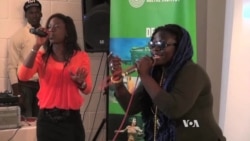DAKAR —
Hip-hop takes serious work. That was the refrain of a week of workshops for young women in Dakar organized by the local organization Africulturban. There was a graffiti art show and slam poetry, as well as music and dance instruction.
Dance instructor Khoudia Toure from the SUNU Street studio works with a group of teenage girls on a series of geometric arm movements.
“Right angles like the window panes,” she says.
"Two, three, four, five," she says, demonstrating. "We practice. We practice. We practice," she says, "until it's perfect."
Helping women find their own urban voices
Hip-hop may still be a man's world in Senegal, but more women are breaking into the so-called "urban arts." In Dakar, a local organization is holding workshops to mentor, train and help the country's next generation of female hip-hop artists find their own voices.
For the aspiring female rappers upstairs, it was an intense week of writing, rewriting and laying down tracks in the studio.
The women collaborated on two songs that they performed at the week's final event. One of them a "take me as I am" anthem. The other on the theme "Free Voice."
The crowd cheered in appreciation at the rhythmic flow of 18-year-old Nikita's verse.
"What I'm saying in my verse," she says, "is it's time to give women a chance to say what they want to say in hip-hop. The same chance that men get to express themselves."
But 25-year-old rapper Sister L.B. says they can't keep waiting on the men to invite them in.
"I know sooner or later I'm going to be somebody," she says. "That's what matters. I believe in myself. It's not you who's going to help me make it. I have to help myself so you can help me."
Industry insiders here say female artists need polished skills and resources to go pro.
'Be who you really are'
Prominent Senegalese rapper Keyti coached the women on their writing during the week.
"Up to now," he says during an open debate before their performance. "It's been the two extremes -- the women acting like tomboys or trying to be Rihanna. Can we get to a point where female Senegalese rappers just get up on stage and be who they really are without feeling like they have to play a part?"
But female rapper and the event's emcee, Moona, says that is easier said than done in the mainstream.
"Let's be honest," she says. "People love us when we wear miniskirts and heels but when you come as an intellectual with something clear and smart to say, there's a problem. People get annoyed. You are no longer a doll."
That isn't stopping this new generation of female rappers from taking on big issues in their verse -- motherhood, love, poverty, education.
When they take that mike, they say, their voices must speak for thousands.
Dance instructor Khoudia Toure from the SUNU Street studio works with a group of teenage girls on a series of geometric arm movements.
“Right angles like the window panes,” she says.
"Two, three, four, five," she says, demonstrating. "We practice. We practice. We practice," she says, "until it's perfect."
Helping women find their own urban voices
Hip-hop may still be a man's world in Senegal, but more women are breaking into the so-called "urban arts." In Dakar, a local organization is holding workshops to mentor, train and help the country's next generation of female hip-hop artists find their own voices.
For the aspiring female rappers upstairs, it was an intense week of writing, rewriting and laying down tracks in the studio.
The women collaborated on two songs that they performed at the week's final event. One of them a "take me as I am" anthem. The other on the theme "Free Voice."
The crowd cheered in appreciation at the rhythmic flow of 18-year-old Nikita's verse.
"What I'm saying in my verse," she says, "is it's time to give women a chance to say what they want to say in hip-hop. The same chance that men get to express themselves."
But 25-year-old rapper Sister L.B. says they can't keep waiting on the men to invite them in.
"I know sooner or later I'm going to be somebody," she says. "That's what matters. I believe in myself. It's not you who's going to help me make it. I have to help myself so you can help me."
Industry insiders here say female artists need polished skills and resources to go pro.
'Be who you really are'
Prominent Senegalese rapper Keyti coached the women on their writing during the week.
"Up to now," he says during an open debate before their performance. "It's been the two extremes -- the women acting like tomboys or trying to be Rihanna. Can we get to a point where female Senegalese rappers just get up on stage and be who they really are without feeling like they have to play a part?"
But female rapper and the event's emcee, Moona, says that is easier said than done in the mainstream.
"Let's be honest," she says. "People love us when we wear miniskirts and heels but when you come as an intellectual with something clear and smart to say, there's a problem. People get annoyed. You are no longer a doll."
That isn't stopping this new generation of female rappers from taking on big issues in their verse -- motherhood, love, poverty, education.
When they take that mike, they say, their voices must speak for thousands.





